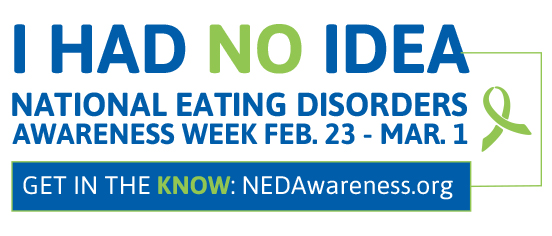I wonder how many people all of us look at on a daily basis struggle with an eating disorder? How many people would you look at and say “YOU have an eating disorder? I Had No Idea!” Which is why this year’s NEDA Eating Disorder Awareness theme is perfect – it takes us beyond the skeletal frames and vomiting.
I have been very honest about my own struggles with weight loss here and the path to my first marathon here … and what I realized along the way is that I don’t interact with food like a normal person.
I regularly say that I have ‘disordered thinking’ regarding food, and that it is not something that you ever ‘cure’.
But over the last few years as I have looked into my own patterns, I have learned more about eating disorders in general – and they are not always what you would expect from stereotypes and Lifetime Channel movies!
From the NEDA site:
Eating disorders – such as anorexia, bulimia, and binge eating disorder – are serious, potentially life-threatening conditions that affect both a person’s emotional and physical health. In the United States alone, 30 million people will be impacted by an eating disorder at some point in their lifetime. Eating disorders can include extreme emotions, attitudes, and behaviors surrounding weight and food issues. These conditions affect all kinds of people and don’t discriminate by race, age, sex, age or size.
This year, during Eating Disorder Awareness Week, they are really focusing on the ‘hidden disorder’ – the one that occurs but isn’t immediately obvious. The person isn’t skeletal, doesn’t exhibit binge & purge or severe restriction or other typical signs. Instead we are learning about more subtle cues – the person who always arrives late to dinner parties to miss the appetizers, erratically claims food allergies only sometimes to avoid eating certain things, they and can never be pinned down to get together socially because they are either heading to the gym or have a ‘prior commitment’.
During Eating Disorder Awareness Week, each day will be spent focusing on a certain area. Here are a snippets from a few:
Marginalized Voices – There are many stereotypes about what a person with an eating disorder looks like, but the truth is that these illnesses do not discriminate. Men and women of all ethnic backgrounds, ages, sizes, and sexualities are susceptible to poor body image and disordered eating. While women are more commonly affected by eating disorders, 10 million men and boys will battle some form of the illness at some point in their lifetime and, due in large part to stereotypes and cultural bias, males are much less likely to seek treatment for their eating disorder.
Youth/Bullying – While eating disorders may first appear to be solely about food and weight preoccupations, those who who struggle with them are often using their disordered eating to cope with feelings and emotions that may otherwise seem overwhelming. Bullying can trigger feelings of shame, isolation and hopelessness. It can also be a trigger for eating disorders. As many as 65% of people with an eating disorder said that bullying contributed to their condition (b-EAT).
Dieting and Eating Disorders – Americans get many mixed messages about health—and many of those messages are far from healthy. We hear about the virtues of “good” foods and the evils of the “bad” ones. Our national fixation on weight loss has resulted in $60 billion in profits for the diet industry – an industry whose products and weight loss plans are often the catalyst to an eating disorder.
For today the focus is something that hits home for me – athletes. I’ve had a personal blog for many years, but after running my marathon I put more focus on it for a while and read many more running / ‘healthy living’ blogs, and was astonished at how widespread disordered thinking about food and exercise actually was:
Athletes and Eating Disorders
Body image problems, disordered eating and full-blown eating disorders are common among athletes. Though most athletes with eating disorders are female, male athletes are also at risk—especially those competing in sports such as wrestling, bodybuilding, gymnastics, and running, which tend to place an emphasis on the athlete’s diet, appearance, size, and weight requirements.
In a study of Division 1 NCAA athletes, over one-third of female athletes reported attitudes and symptoms placing them at risk for anorexia nervosa (Johnson, Powers, et al, 1999). In weight-class and aesthetic sports about 33% of males and up to 62% of females are affected by an eating disorder (Thompson, PhD. 2010). The good news is that with information and awareness, coaches, parents and teammates can all play an important role in confronting eating disorders and ensuring that athletics are a positive experience for everyone.
The important thing is to realize that you are not alone, not ‘broken’, and that it is nothing to be ashamed about. However it can become very serious and have significant health repercussions over time – I have friends from my running and blogging who are in recovery and who have lifelong digestive, heart and bone issues … and many of these people are in their 20s!

